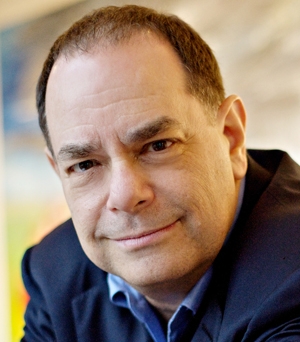Enabling Change
Re-Framing Our Young People's Times, Part 2
Topics

Next generation learning is all about everyone in the system—from students through teachers to policymakers—taking charge of their own learning, development, and work. That doesn’t happen by forcing change through mandates and compliance. It happens by creating the environment and the equity of opportunity for everyone in the system to do their best possible work.
EMPOWERED! Chapter 3
Empowering young people is about making it possible for them to choose their own direction, to get useful things done, to impact their world.
Note: This article is a reprint of the second half of “Chapter 3: Re-Framing Our Young People’s Times” from the author’s book, EMPOWERED! Re-framing ‘Growing Up’ for a New Age. If you haven't already, read the first part of Chapter 3.
What Does ‘Empowering’ Young People Mean?
But what, exactly, does “empower them” mean? Many adults think they are already empowering young people. Some even think education—as we do it—is empowering for young people.
I strongly disagree, because the term empowerment, for me, has a very specific meaning:
Empowerment is SELF-DIRECTION plus ACCOMPLISHMENT with IMPACT.
If the people can’t choose their own direction(s) to go in, and we can’t actually see their accomplishment(s)—i.e., results with positive real-world impact—there is no empowerment.
Without that choice and impact, our young people are NOT empowered—yet. There may be “improvement” along some dimensions, or even an increase in “potential.” But an increase in “potential,” or “theoretical power to accomplish someday,” is not, for me, empowerment.
Empowerment is rather the “actual demonstration of getting done useful things they want to in their world.” Getting useful things done—and having impact—is something that the world’s newly empowered young people are now capable of doing at a level far beyond what their parents or forebears were capable of at their age—no matter what that age may be.
The “judges” of usefulness and impact are the young people themselves and the communities in which they live. Combined with New Empowering Beliefs—which I will discuss in Chapter 6—this “empowerment through self-direction and accomplishment with impact” is what defines the New Age.
Will the New Age of Empowerment Hurt or Harm Young People, or Help Them?
Many adults hesitate before wanting to empower their children in this sense of self-direction, real-world accomplishment, and new beliefs. Many cry “Wait—look at all the time they’re spending with screens—we don’t really know all the consequences—maybe it’s bad for them.” Others say, “just let them be kids,” meaning “don’t give them responsibilities like we have—those will come later.”
I believe most adults want to help young people. (Although sadly, it should be noted, we still have a world with child trafficking, kid-armies, and laws dictating where young people, whether they like it or not, must spend their day.) Certainly, no young person wants to be harmed.
But there is good news for those young people.
I think what “being a kid” and “growing up” means will be far different in the new Age of Empowerment—and much better. Play, for example, may still be important, but rather than just playing in the streets, or in their bedrooms, young people are now becoming empowered—through their play and otherwise—to voluntarily and happily have a positive impact on their world.
The bad news, however, is that adults are often willing to help only within their own, old, frame of “unempowered kids.” Too many adults are still willing to ban devices, limit screen time, force kids to study things they don’t want to, and keep kids from what they imagine—not actually knowing much about them—as perils. One of my saddest memories is asking a high-school girl if she played videogames. “No,” she answered, “my parents deprived me.”
I believe the most useful way to re-frame the 20th century—the time in which all today’s adults were born—is as having ended.
Do Our Children Need to Be Like Us?
I think a big reason we are willing to do these backward-looking things is that we want our children to be like us. We want them to live in our frame—and not to move to becoming something else.
But already, the young people of today—and certainly those of tomorrow—are NOT like us (i.e., like 20th century-born adults) in many fundamental ways. Although they may appear the same on the surface, they are no longer “little us’s.” Their capabilities and beliefs are changing rapidly and radically, along with their world—and re-framing on our part can help them move forward into that new world, as we will see.
Adults who keep young people from their own future—even with the supposed justification that it is “for their own good”—truly do harm to those young people by holding them back. Rather than dragging our children back to the lives we thought (and may still think) are good—even though we are worried, and even though we want to pass on to our children things we enjoyed in the past—we should be trying to empower young people as quickly as possible to succeed in the new frontier that will be their life. That is why I think it is so useful to re-frame their times as a New Age of Empowerment for young people.
Reframing the Previous (20th) Century
In addition to re-framing the future, it is also useful to re-frame the past—i.e., to revise our perspective of the 20th century based on what we now know. Currently, I believe the most useful way to re-frame the 20th century—the time in which all today’s adults were born—is as having ended.
Many 20th-century people—particularly in certain places—saw their own times, or parts of those times, as being the best ever for humans—and want to preserve those parts as a legacy for their children. But as good as many of today’s adults may think their century was, they are better off accepting and dealing with the fact that their children are now in a new time. My sense is that few, if any, young people have a desire to go back. Young people both want and need to live in their own times.
And the times, since the start of the 21st century, have changed both rapidly and radically. Our children now live—and will live—in an Age of Empowerment, coming fast to all, and empowerment is what they should be expecting. Without denigrating, in any way, the accomplishments of the people of the 20th century, those people are—as I said at the start—the last individually un-empowered generation the world will ever see. Today’s young people—the first generation to grow up from birth with an internet rather than dragging our young people back to the lives we thought (and may still think) are good—are the first generation of a New Age—an age of empowered young people.
Empower Them Now!
Remember, our criterion for a successful re-frame is usefulness. It is very useful to frame the period we are entering into as a great time for the people who have the good fortune to be young at this moment—i.e., at the start of the 21st century. Of course, some of these young people currently have less than others, in many ways, and we should help them catch up. But even the less fortunate—and all people alive today, if they want it—have huge new power in their hands to shape their world in a positive way.
Yet…
Yet as many young people are now finding out—including young activist Greta Thunberg—the new power will not be easily and generously handed over by adults. Nor will adults change their behaviors just because young people think differently. In many cases, power will need to be seized from the adults, who believe it is theirs—even when they are not doing a good job with it. Today’s young people must choose to and work to deploy their new power for it to have maximum positive effect.
Any adults who want to help young people will do well to re-frame their own task from “protecting young people” to “empowering young people.” If enough adults do this, the New Age of Empowerment will be a wonderful time for all of us. If not, the transition we spoke of at the start will be much more painful.
In the coming chapters we shall look more closely at who those newly-empowered young people are.
| Harbingers |
| Among the harbingers of the New Age of Empowerment are the many young YouTube stars who have already figured out—many before they are teenagers—how to earn considerable incomes from doing what they love. They have realized early that by sharing their unique talents, (whatever they may be, from broad entertainment, to niche sharing, to instruction on game playing, flying, and huge numbers of other things not taught in school) they can connect directly with their own world-wide “affinity group” that will support them and their work. |
| Reflection Questions |
| Do you agree that we are moving to a New Age of Empowerment of young people? Why or why not? If so, is it good or bad? For whom? |
Read More: EMPOWERED!
- Chapter 1: Re-Framing Growing Up for a New Generation, Part 1 and Part 2
- Chapter 2: A New Generation Seeing Things in a New Way, Part 1 and Part 2
- Chapter 3: Re-Framing Our Young People's Times, Part 1
- Chapter 4: Re-Framing Who Young People Are, Part 1 and Part 2
- Chapter 5: Re-Framing Where Young People Will Live, Part 1 and Part 2
- Chapter 6: Re-Framing What Young People Believe, Part 1 and Part 2
The full book is available on Amazon.
Photo at top by Ali Pazani.




